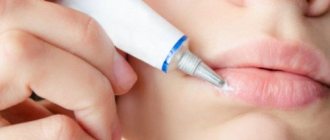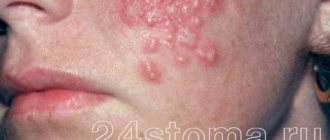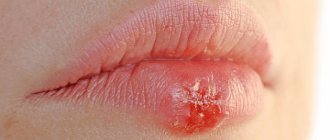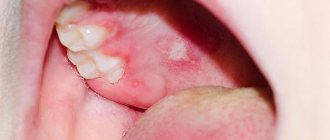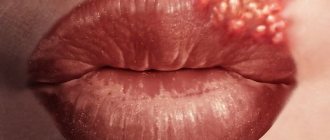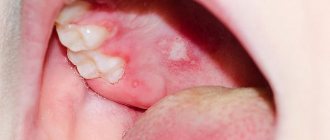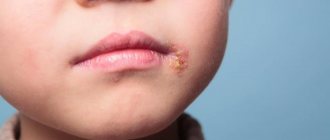Pediatrician Mikhail Nikolsky: Herpes - to treat or not to treat
Alexandra Petrovskaya: Good afternoon. This is a program for the biggest ones. With us in the studio is pediatrician and candidate of medical sciences Mikhail Nikolsky. Mikhail Andreevich, hello.
Mikhail Nikolsky: Good afternoon.
A.P.: We have gathered here today about your scientific work on herpes types 6 and 7. Let's try to explain to the listeners what it is, and, most importantly, where these types come from, and what other types - the first, second, third and so on - go up to 6 and 7.
M.N.: In total, there are 8 or 9 types of herpes, depending on how you count. The first and second types are common herpes, which causes cold sores on the lips. The third type is the herpes zoster virus, which causes chickenpox or shingles in adults.
A.P.: So what we call chickenpox is, in fact, the same herpes?
M.N.: Not the same, it’s a completely different herpes, but also herpes.
A.P.: By what principle are they all united under this name?
M.N.: It's difficult. When scientists studied the DNA of these viruses, it turned out that they all had similar related features. The fourth type, Epstein-Barr virus, causes infectious mononucleosis. The fifth type is what everyone knows as cytomegalovirus. These are also often infections, mostly for children.
And finally, type 6 and 7 are what I do. Most often they cause roseola in children - a three-day fever or sudden exanthema. Next comes the eighth type of herpes, it occurs in Kaposi's sarcoma. This is a serious disease that predominantly occurs in HIV-infected patients.
A.P.: Besides the common name and some similarities in DNA, what else unites them? Maybe there are common methods of therapy or similar effects of the virus on the body?
M.N.: Firstly, unlike many other viruses, there is a medicine against herpes. This is what makes these viruses different from others in many ways because there are no cures for a huge number of viruses.
A.P.: What about all these fashionable antiviral drugs that are advertised everywhere?
M.N.: Everything that is advertised on TV is, unfortunately, most likely fake.
A.P.: Fakes are prohibited.
M.N.: Fakes are prohibited, but, apparently, advertising of drugs without proven effectiveness is allowed.
A.P.: This is a topic for a separate program.
M.N.: This is a problem for our country, because in our country fakes have even found their way into clinical recommendations. And we treat people with all these “bullshit drugs.” Moreover, we are obliged to treat them, because we have appropriate clinical recommendations.
A.P.: Is someone lobbying for this?
M.N.: Of course, this is lobbied for, it is paid for. And what to take if, excuse me, we have one of the members of the Russian Academy of Sciences - a homeopath.
A.P.: In these words you can feel your contempt for homeopathy.
M.N.: From the point of view of a clinical physician, to some extent, yes, contempt, this is true.
Let's return to herpes. They have a unique feature. After a person becomes ill with a primary herpes infection, these viruses do not leave the human body. All herpes that a person encounters in life remain with him forever.
A.P.: I came across the statement that it is difficult to meet a person on Earth over 10 years old who does not have antibodies to one or another type of herpes.
M.N.: And not only antibodies, but even the herpes themselves. In almost all people after a certain age, one or another herpes can be found in saliva, blood or other tissues. This is the problem with diagnosing them - doctors very often get confused. Colleagues, out of ignorance, but with the best intentions, prescribe, for example, saliva tests for frequently ill patients for the Epstein-Barr virus, cytomegalovirus, herpes type 6, type 7, and find them in the saliva. And this is the norm.
A.P.: Are they starting to treat?
M.N.: Yes, absolutely right. The patient does not know that this is the norm. He sees that he has a “terrible” test, that such and such a number of these herpes have been found, and the doctor, most likely, out of ignorance and lack of understanding of this problem, begins to treat normal carriers of herpes. And what does he treat? He treats with the same fuflomycins. And nothing happens.
A.P.: Bottom line – there is no need to treat herpes?
M.N.: It is necessary if it caused a serious illness - and all herpes in certain cases can cause serious illnesses. For example, herpes type 6 is a common cause of severe conditions in patients after a bone marrow transplant. If herpes after a bone marrow transplant has worsened against the background of a decrease, the actual destruction of one’s own immunity, then therapy necessarily requires powerful antiviral agents.
Well, take chickenpox – it would seem a harmless disease. But after 11 years it is difficult and can have consequences. Therefore, it is believed that if the patient is under 11 years of age, it often goes away on its own. And if you are over 11 years old, then it is better not to risk it, but to prescribe acyclovir.
A.P.: Is this a drug with proven effectiveness?
M.N.: Yes, it acts specifically on the chickenpox virus.
A.P.: It turns out that herpes, which is always in the body, at some point gets worse. For example, I heard about herpes type 6, that this is a typical disease for children under 2-3 years of age. It turns out that no.
M.N.: The fact is that herpes type 6 is the most common infection that always causes sudden exanthema or three-day fever or roseola. In principle, it is a very understandable infection: the child has a high fever for three days, then a typical maculopapular rash appears. Within two days it disappears on its own and the person recovers.
The infection itself can occur even through an ordinary kiss, as happens with many herpes. That is, the virus can enter the child’s body through contact with the saliva of the mother, grandmother, or any adult, who are usually the carrier of all herpes. And so the child suffers this primary infection through the human herpes virus type 6, and after that the human herpes type 6 remains in this child forever. And it won’t go anywhere, and there’s no way to get rid of it.
But it needs to be treated only in one situation - if it has caused some kind of serious illness, which almost never occurs in healthy people. Only for severe immunodeficiencies, which usually occur during organ and tissue transplantation. There are situations when intensive treatment of herpes type 6 is required.
In all other cases, there is no need to shock-treat it. And we must keep in mind that herpes is a very fashionable topic now. Herpes virus type 6 is easy to find, which means it can be presented for almost any disease as a possible diagnosis. And many doctors use this. For example: “I don’t know what’s wrong with you. Let’s look for what you definitely have.” And here is herpes type 6 - it definitely exists, and it is there.
A.P.: Another such moment. What other diseases can be associated with herpes viruses that are present in the body?
M.N.: As I already said, herpes types 6 and 7 “classically” cause roseola in children. Herpes type 6 and sometimes, but rarely, type 7 are also associated with febrile seizures in children. There are studies that show a connection between certain types of epilepsy and human herpes virus type 6. So it turns out that herpes type 6 actually causes a type of epilepsy.
A.P.: This virus is present in almost everyone’s body, but not everyone has epilepsy. That is, this suggests that there is no direct connection; there are other factors influencing the appearance of this disease?
M.N.: Of course, there are many factors here. For example, two people caught the same infection: but one had a runny nose, and the other had meningitis. But the infection is the same. Of course, there are many factors involved.
There was also a study that associated human herpes viruses 6 and 7 with other diseases, suggesting a link with multiple sclerosis. But this has not been proven. This is already a field of science, but we do not have clear indications that herpes is exactly what causes multiple sclerosis.
A.P.: During the program, we talked briefly about all herpes and outlined all the important points. And, concluding the conversation, I want to return to the beginning. What questions does science face today in this area?
M.N.: By the way, I forgot to say that a special form of human herpes type 6 is the chromosomal integrated form of this virus, when herpes type 6 is introduced into the human chromosome and begins to be inherited by all generations.
Now we have received a grant in St. Petersburg. We conduct free examinations of everyone for certain indications for the presence of chromosomally integrated human herpes type 6. It is precisely the presence of chromosomally integrated human herpes type 6 that may provide links with certain diseases. It turns out that almost 1% of the world's population has a chromosomally integrated virus built into its genome.
A.P.: Okay. Remembering my student years, what hypothesis do you have in this scientific research? If something, then what?
M.N.: We are currently recruiting a reference group, we are looking for people, we are examining them. I personally am now most interested in whether there are clinical manifestations of chromosomal integration of human herpes type 6 in newborns. In my opinion, this is the most interesting concept; no one in the world has yet developed this direction. So far there are preliminary results, but I’m not ready to announce them yet.
A.P.: Our guest was Mikhail Nikolsky, a pediatrician and candidate of medical sciences. Thank you and have a nice day everyone!
Herpesvirus infections in children
Normally, every person is constantly home to a huge number of viruses, fungi and bacteria. Such permanent “residents” of our body include herpes viruses.
There are several species in the herpesvirus family, and they all have one thing in common - once they get into a person, they never leave him. When examining people for infection with these viruses, it turns out that 70.4% have herpes viruses type 1-2, 97.9% have varicella zoster (varicella zoster virus), 95% have cytomegalovirus, 97.5% have herpes virus type 6 , 95% have Epstein-Barr virus.
Primary infection with herpes viruses occurs in early childhood. Sometimes the virus enters the body asymptomatically, and sometimes it is accompanied by a clinical picture characteristic of the virus. Depending on the reactivity of the body and the state of its immunity, the disease can be quite severe.
Thus, the primary acute disease caused by type 1 herpes viruses is characterized by severe damage to the oral mucosa. The child has a high temperature for several days, he refuses to eat, intoxication is severe, painful ulcers appear in the mouth, the submandibular and cervical lymph nodes become enlarged and painful. Improvement may occur only by 5-7 days, and in some children recovery may take up to 2-3 weeks. In the future, under unfavorable conditions, the virus can rear its head again (recur), but its manifestations, as a rule, are not so severe - most often these are blistering rashes on the lips, which are popularly called a “cold.”
The chickenpox virus (Varicella zoster) also belongs to the herpesvirus family.
When meeting him, the child gets chickenpox. After this, immunity to the virus is developed, a person should no longer get chickenpox a second time (repeated cases of infection are extremely rarely diagnosed), but the virus does not completely leave the body, but remains dormant in the nerve ganglia. When the immune system is weakened (usually in older people), this viral infection recurs in the form of herpes zoster. Bubble elements appear on the skin along the peripheral nerves and in half of the cases along the intercostal nerves. The rash covers the torso like a belt (the word “zoster” in Greek means belt). This condition is accompanied by severe pain - neuralgia and, sometimes, general intoxication.
Herpes virus type 6 during primary infection can cause an acute infectious disease in a child, called sudden exanthema (infantile roseola, sixth disease). First, a high temperature occurs, which lasts an average of 3 days. In most cases, there are no catarrhal symptoms, only slight redness in the throat. Then, as the temperature drops, a red spotty rash appears, which lasts 1.5-2 days and disappears. If the child also received an antibiotic, this rash may be mistakenly regarded as a drug rash. Complications are rare. When the virus enters the latent stage, it most often does not manifest itself in any way. But its involvement in some diseases (for example, chronic fatigue syndrome) is discussed.
Cytomegalovirus and Epstein Barr Virus. Most often they quietly settle into the body, but sometimes in children they manifest themselves as a disease such as Infectious mononucleosis. It can be difficult. There is prolonged high fever, generalized enlargement of the lymph nodes, and especially the lymph nodes of the neck. They grow so large that they visually deform the neck, but they hardly hurt. Other lymphoid formations, such as tonsils and adenoids, also greatly increase. Because of this, the child cannot breathe through his nose and snores at night. Plaques, most often filmy, may appear on the tonsils. The liver and spleen may become enlarged, and sometimes a rash and jaundice may appear.
After suffering any of the above infections, during examination, blood tests determine antibodies specific to the specific virus involved in the disease. Only a doctor can interpret test results. And if the antibodies are positive, this does not mean that the infection is alive, and we must continue to fight it. Most often, this is a memory of an encounter with the virus, and only a doctor can tell you whether it is still active or not.
No need to treat tests! It is necessary to treat the child if his condition requires it.
In each specific case, the doctor will prescribe treatment; sometimes hospitalization is required due to severe infection.
The parents' task is to consult a doctor in time.
And after recovery, follow certain rules so that the immune response is adequate and the infection no longer rears its head.
After an infection, the child’s immune defense remains reduced for a long time and he needs:
- avoid contact with other infectious patients, hypothermia and overheating for about 3 months;
- if necessary, medical withdrawal from vaccinations is recommended;
- It is advisable to follow an antiherpetic diet.
The anti-herpes diet is based on the ratio of two essential amino acids - arginine and lysine.
Lysine suppresses herpes viruses, arginine promotes their reproduction. Products rich in lysine: milk, curdled milk, fermented baked milk, cheese, cottage cheese, yoghurts containing live bacteria, potatoes, fish, pork, vegetables, white chicken, soybeans, lentils, brewer's yeast.
Arginine: chocolate, sugar, raisins, sesame seeds, seeds, nuts (especially peanuts), cereals, wheat bread, oranges and tangerines.
Be healthy!
about the author
- Dobrelya Ekaterina Alexandrovna
- Pediatrician, infectious disease specialist of the highest category. Head of outpatient department No. 2
- All publications by the author
When fatigue is a sign of herpes...
Herpes virus type 6 (HHV-6 or HHV-6) was discovered back in 1986. In 2012, a sensational discovery occurred: it turns out that the herpes virus type 6 in adults may not manifest itself in any way, but can still cause a painful condition
Where does it come from?
According to various sources, about 80% of people are infected with herpes virus type 6. Most often, the infection occurs in early childhood - between the ages of 6 months and 2 years. This is due to the child’s loss of maternal immunity and the high prevalence of the virus. The first meeting can occur in the form of roseola - a sharp increase in temperature, after which a rash appears after 3-4 days. This is the only specific manifestation in children that can be used to suspect HHV-6.
Alas, once in the body, any herpes virus will not leave it. In most people, the immune system quite successfully suppresses the development of herpes virus type 6. Continuing to live in the body, but does not affect anything. But this does not happen for everyone.
Always exhausted
Chronic fatigue syndrome (CFS) has long been considered an independent disease. This is not the kind of fatigue that can be “cured” by vacation, a change of job, or just normal sleep. CFS is diagnosed when a person experiences persistent fatigue and a 50% or more decrease in performance for 6 months or more. In this case, there are signs of chronic infection: low-grade fever, enlarged lymph nodes, muscle and joint pain, chronic pharyngitis, headaches.
Sleep disturbances, depression, irritability, difficulty concentrating, memory and intelligence deterioration often occur. Sometimes appetite disappears, a person suddenly loses or gains weight, problems arise in the stomach, intestines, and urinary system. Moreover, allergy symptoms or sensitivity to bright light, alcohol, medications, etc. may appear.
Before receiving a diagnosis of chronic fatigue syndrome, a person must undergo examination to rule out other diseases. Often the only objective sign of infection is the identification of herpes type 6
How to find out?
At the stage of making a diagnosis or to clarify it, doctors prescribe a laboratory test Antibodies to the herpes virus type VI (Herpes simplex virus VI), IgG. You can take it yourself if you are concerned about decreased performance, and then consult a doctor. For him, it is enough to donate blood in the laboratory 3 hours after eating or in the morning on an empty stomach.
Any decrease in immunity can trigger HHV-6 to become active. Most often it is triggered by stress, flu, or exacerbation of a chronic infection. Often people associate a tired-depressive state with a consequence of illness or stress, but in fact they have become a trigger for the activation of the virus. The active virus lives and multiplies at the expense of lymphocytes - the main cells of the immune system. Therefore, symptoms of infection and damage to the nervous system, which is closely related to the immune system, arise. When the HHV6 virus is activated, it can be detected by PCR in oropharyngeal scrapings or in urine. If there are skin rashes and fever, then herpes virus type 6 can be detected in the blood.
Who will need it?
Doctors identify several groups of patients who need testing Antibodies to the herpes simplex virus VI, IgG, or detection of herpes viruses in an oropharyngeal smear. These are the people who are concerned about:
- memory problems, inability to concentrate on business;
- causeless pain and sore throat;
- soreness of the lymph nodes in the neck and under the ears for an unknown reason;
- muscle pain not associated with physical activity;
- joint pain that has no objective cause (trauma, osteochondrosis, etc.);
- headaches that have never happened before;
- sleep problems;
- weakness and exhaustion after physical activity, clearly not corresponding to the expenditure of effort;
- frequent colds
- feeling of fever or chills at normal temperature
How to treat?
Antiviral drugs for other types of herpes can also be effective for HHV6 infection; the choice of treatment available in Russia is up to the attending physician (different antiherpetic drugs are registered in different countries). Therefore, symptomatic treatment plus boosting immunity is mainly carried out.
Despite all this, type 6 herpes virus is not a death sentence. You can live with it once your immune system can get it under control. Surprisingly, a healthy lifestyle can be of great help in this regard. It is imperative to improve your sleep: for those who sleep less than 6 hours a day, the risk of developing CFS is several tens of times higher.
Get tested on time, and treatment will be the least expensive!
To the patient about herpes. "Cold" on the lips
Authors : Kokotkin I.Yu.
General information Herpes on the lips has several names: “cold” on the lips, fever on the lips, herpes of the lips, herpes labialis, labial or labial herpes.
Cold sores on the lips are predominantly caused by herpes simplex virus type I (HSV-I) . 95% of people have this virus in their bodies. In rare cases, the cause of herpes lips is the herpes simplex virus type 2 (transmitted through oral sex).
The herpes simplex virus, which causes colds on the lips, remains inside the human body for life. At the moment, no drugs or treatment methods have been developed that would completely destroy the herpes simplex virus in the human body.
Up to 10,000,000 Russians suffer from “colds” on the lips every year. Approximately every 5 Russians get herpes of the lips from 2 to 10 times a year. And only about 5% of the human race has immunity to HSV-I, the reasons for which are still unclear.
The virus enters the body in early childhood: at 3–4 years, when the antibodies against the herpes virus transmitted to the baby by the mother are depleted. Most often, infection occurs if a child is kissed by carriers of the infection. For example, parents, brothers, sisters and other relatives. In addition to a kiss, the virus can enter the body along with the biological fluids of others, for example, saliva. When it comes to “visit” us, it penetrates the mucous membranes and reaches the nerve endings. Along them, with a flow of fluid that feeds the nerves, it rises into the cranial cavity, where it “hides” in a nerve plexus called the trigeminal ganglion and “sleeps” there until it is reactivated.
Reactivation of the virus is possible at the moment when immunity “decreases.” A “lowered” immune system can occur due to: colds, flu, menstruation, emotional distress and stress, strong ultraviolet radiation, excessive alcohol consumption, upset stomach and fatigue.
Causes of recurrence of herpes on the lips: - Stress or emotional distress; — Various somatic diseases, in particular colds, flu, diabetes, HIV; — Poisoning or intoxication; - Drinking alcohol, caffeine and smoking; — Excessive ultraviolet irradiation; — Hypothermia or overheating; - Arrival of menstruation; — Overwork and exhaustion; — Inadequate nutrition/diet or stomach upset; — Other factors individual for each person;
After “awakening”, the virus is sent back to the skin by the nerves (like a train on rails) extending from the trigeminal ganglion. It is important to know that the trigeminal plexus gives off branches that innervate the lips, oral mucosa, gums, skin on the earlobe and part of the cheek. Lesions on the skin will be located in accordance with the exiting nerves. As the virus travels through a nerve, it causes inflammation of the nerve tissue, which causes pain along the nerve fiber.
Stages of development of a “cold” on the lips
In its development, the disease passes through stage IV:
Stage I - pinching. This is when most people feel like they are getting sick. Before a “cold” appears, the skin in the corners of the mouth or the inner surface of the lips, or on the tongue, or even all over the face begins to itch. In the place where a relapse of herpes will soon develop, harbingers of the disease appear: pain, tingling, tingling, itching. The skin over the site of future relapse turns red.
The development of the disease can be prevented if acyclovir-based drugs (Zovirax ointment) are used at this stage. If you are experiencing severe itching, you can take an aspirin or paracetamol tablet.
Stage II - the stage of inflammation, begins with a small painful vesicle, which gradually increases in size. The bubble is tense and filled with a clear liquid, which later becomes cloudy.
Stage III is the stage of ulceration. The bubble bursts and a colorless liquid oozes out, filled with billions of viral particles. An ulcer forms in its place.
At this moment, the sick person is very contagious, as he releases a huge amount of viral particles into the environment. Because of the soreness and ulcers on the face, this stage bothers people the most.
IV stage of scab formation. A crust forms over the ulcers, and if damaged, it can cause pain and bleeding.
Herpes rashes are most often located on the red border of the lips, but can also be on the nose, on the cheeks, in the ears, on the forehead, in the oral cavity: on the gums, the inner surface of the lips and cheeks.
Complications of a cold on the lips
If personal hygiene rules are not followed, the virus can also affect other parts of the body: if you rub your eyes with your hands after touching blisters or sores, you can provoke ophthalmoherpes or ocular herpes - a severe eye infection, sometimes leading to decreased vision and even blindness. Herpetic eczema may develop - infection of the skin of the fingers by the virus.
If you kiss someone with ulcerated lips, you can pass the infection to a child or loved ones. Oral sex with a partner with an active “cold” on the lips can lead to “ genital herpes .” Those. during an outbreak of a “cold” on the lips, herpes can be mechanically transferred from the lips of a sexual partner “active” in oral sex to the genitals of the recipient of oral sex.
Here is how patient M. describes the severe course of a herpetic infection on the lips:
“In childhood, there were frequent rashes on the lips, but now they mainly appear on the nasal mucosa or in the form of stomatitis. You can’t treat stomatitis, but it stays stable for a week. Headaches and intoxication are very disturbing; as a rule, out of the blue, symptoms of severe poisoning appear. Tablets for the “head” help with difficulty, but an injection of analgin with diphenhydramine more or less helps. Not a single doctor even wanted to hear about headaches.”
In people with reduced immunity (immunosuppression, HIV infection), necrotic forms of the course with the formation of scars on the skin are possible.
Advice for people with colds on their lips
— Strictly follow the rules of personal hygiene . The “cold” is contagious! Always wash your hands with soap and water before and after touching cold sores, including after applying antiviral cream. - Don't touch your eyes! Especially women while applying makeup; — Do not use saliva to wet contact lenses. - Despite the itching and pain, you should not touch the rash, kiss, especially with children, use someone else’s lipstick or borrow your own, smoke one cigarette with a friend. — Do not try to remove blisters and scabs to avoid transmitting the infection to other parts of the body or causing a bacterial infection. - Stop having oral sex! Oral sex during a “cold” on the lips of an “active” partner can cause genital herpes in a partner passively participating in oral sex. In this case, herpes from the lips of the “active” partner can be transferred to the genitals of the partner receiving caresses. - If you have a cold on your lips, use individual dishes or a towel, do not drink from other people's glasses... Caring for a newborn. To avoid infecting a newborn with herpes, women who have herpetic rashes on the lips should wash their hands thoroughly before touching the baby. If there are blisters or sores on the lips, a disposable surgical mask or gauze bandage should be used while caring for the child until the sores dry out. When you have a cold on your lips, you should not kiss or smell your baby. If there is herpes on any other part of the body, then it should be carefully covered and under no circumstances come into contact with the child’s skin.
REMEMBER: - When you feel a tingling sensation, the effect of the virus has already begun, which means it’s time, without delay, to start using antiviral cream or other antiviral drugs prescribed by your doctor; - Use your medicine! Medicines will help stop the development of a relapse or speed up recovery. Use acyclovir-based creams and ointments, which will help the blisters and ulcers heal quickly, and nutritional supplements containing either zinc, L-LYSINE, or hydroxytoluene. Remember that the use of corticosteroids (hydrocortisone ointment) reduces itching, but sharply increases the area and severity of the lesions and the duration of the painful period. — Apply antiviral ointments with cosmetic sticks. To apply antiviral ointments (Acyclovir, Zovirax) to herpetic rashes, use special cosmetic sticks, as shown in this figure.
Applying ointments to the affected area directly with your fingers can lead to the virus being transferred from the lips to the skin of the fingers. — If you have frequent relapses, then make sure that you always have the medicine at hand. Like a passport or money, always keep it with you;
— Acyclovir-based creams and ointments should be used at least 4 times a day for 5 days. — As prescribed by a doctor, valacyclovir can be prescribed for one-day treatment of herpes of the lips. If you take two tablets of valaciclovir 500 mg, first in the morning and then in the evening, within 24 hours from the onset of the disease, then a cold on the lips will not develop or the healing of herpetic lesions will occur faster.
— If the “cold” does not go away within 10 days, be sure to consult a dermatologist, since a “cold” on the lips can be a symptom of other serious diseases that require specialized treatment.
— A long-term course of colds on the lips (more than 30 days) may be a sign of a sharp decrease in immunity, benign tumors and oncological diseases, HIV infection, and lymphoproliferative diseases.
Author: Ivan Yurievich Kokotkin, doctor
Source: https://www.herpes.ru/
